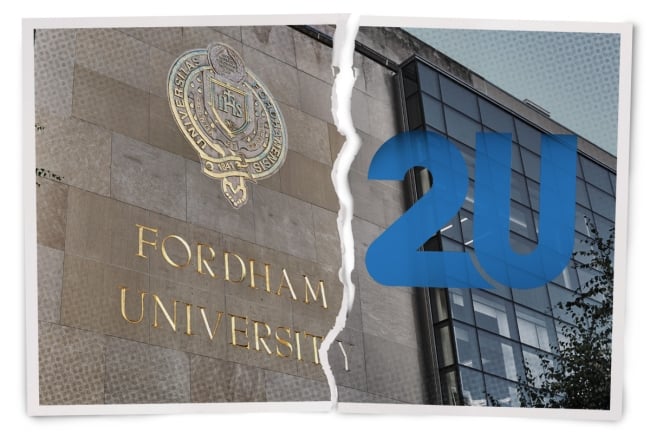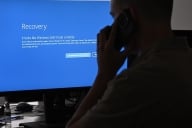You have /5 articles left.
Sign up for a free account or log in.

Fordham University has filed an objection to 2U’s bankruptcy restructuring, claiming the online program manager was “negligent” and cannot carry out its contract.
2U, a company that was once seen as an innovator in the online expansion space and is now in the midst of restructuring through bankruptcy, has insisted that the process will create a stronger, more solid company. Most of its 250-plus partners have stuck with it so far. But Fordham University, a partner of 2U’s for the last seven years, says it has been “continuously plagued” by the partnership, citing low rates of putting students in field placements, an increasing student dropout rate and “lip service” over implementing program changes.
Fordham, a four-year private institution in New York City, filed an objection to 2U’s restructuring in the U.S. Bankruptcy Court in the Southern District of New York. In its complaint, filed at the start of its fall semester, Fordham says it does not believe 2U could continue to carry out its contract with the university to provide online services under the restructuring.
“2U’s repeated breaches and its inability to cure them, much less give adequate assurance of future performance, renders 2U unable to assume the agreement with Fordham,” the filing states.
The objection came after 2U filed for bankruptcy on July 25. The bankruptcy court told each 2U partner they could file an objection to the restructuring. Fordham was the only educational institution to do so, at least formally.
“If they have tried to resolve the grievances other ways to no avail, this could be an avenue to do it,” said Scott Goldschmidt, a partner in the higher education practice at Thompson Coburn, which is not representing Fordham in the case.
Goldschmidt explained that the parties will attempt to resolve their differences through an “alternative dispute resolution” outside the court, and, if they cannot, the bankruptcy court will decide whether 2U materially breached its contract, which would allow Fordham to end its partnership.
A Fordham official said that due to the university’s contractual obligation to 2U, it could not comment. But 2U contested Fordham’s filing, saying it secured on-time placements for more than 95 percent of students across more than 25 degree programs in healthcare and education degree disciplines in 2023. (Note: This paragraph has been corrected to reflect that 2U said it secured placements for more than 25 programs.)
“Our priority is always to serve our partners and learners at the highest level,” 2U said in a statement to Inside Higher Ed. “While we disagree with Fordham’s claims, they are a valued partner, and we are committed to continuing to work constructively with them to ensure a successful partnership.”
Latest Blow to 2U
As one of the first online program managers on the scene in 2008, 2U was seen as a force in ushering in a new era of online courses to help expand universities’ reach.
But years of rising competition, changing institutional attitudes and incurred debt led officials to file in July to restructure through bankruptcy. “The steps we are taking today will enable us to continue investing in our offerings, services, and world-class team to deliver unparalleled online learning to meet the needs of students today,” 2U’s CEO Paul Lalljie said in a statement on the bankruptcy announcement.
That same month, Inside Higher Ed reached out to 50 U.S. colleges out of the 200 globally that were listed on 2U’s site as partners. Roughly two dozen responded, with the majority cautiously stating they were monitoring the situation but were not seeking to end their partnerships.
While Fordham is the only institution to publicly and formally denounce 2U in its latest filing, the University of Southern California was the first to publicly “wind down its partnership” with the company in November 2023 after criticism of its cost and operating model, which many saw as a significant blow to 2U.
The question industry watchers and university partners are now asking is whether Fordham will deal 2U another blow.
Fordham Claims 2U Is ‘Negligent’
Fordham’s 22-page filing details a list of 2U’s “breaches and the inability to cure them.” The university first began working with 2U in June 2017 to expand its master of social work to online programming. The program requires field placements, otherwise known as clinicals, in order to complete a degree.
According to Fordham, its agreement put 2U in charge of identifying and contacting field agencies and field supervisors and facilitating arrangements between students and clinics. But “despite years of good faith efforts” by Fordham, 2U failed to place students in clinicals “in a timely manner, if at all,” the university alleges, causing several students to delay graduation or drop out of the program altogether. In August, it said, 73 students had not been placed in clinicals just 11 days before the fall 2024 semester began.
It’s been a worsening trend, Fordham said, pointing toward 59 students who did not have a clinical placement a week before the summer 2024 semester began, and 23 students who lacked one a week before the spring 2024 semester began.
“Fordham has also lost talented students entirely due to 2U’s incompetence,” the university claimed in the filing, adding that its office had been contacted by several students “regarding their educational prospects, frustration about the lack of progress towards placing them at a clinic, or stress about the next steps.”
The loss of students and delays in placement caused a significant financial and reputational hit to the school, according to the filing.
Debra McPhee, dean of the Fordham University Graduate School of Social Service, said she was in “near daily” contact with 2U in August attempting to find a solution, with other Fordham officials saying “dozens, if not hundreds,” of phone calls and emails were exchanged to express its dissatisfaction.
Staff allegedly had to work overtime to address student concerns “because Fordham and GSS are ultimately the entities that assume the liability—as it is their name and reputation on the line,” according to the policy. “[And] when students are not placed on time or are not replaced quickly, 2U does not have incentive to change its policies.”
The back-and-forth centered mainly around 2U allegedly not placing students that were in immediate need of clinical placement, and instead placing students that were one or two semesters from needing one to complete their degrees. While Fordham officials said it was fine to work ahead on placing those students, current students needed to be prioritized.
“2U’s insistence that it can focus on placing students one or two terms ahead, while simultaneously making sure all the students in the current terms are also placed, is not only unsupported by history, but also rooted in selfishness,” the filing stated.
The filing also included an anecdote about 2U’s alleged lack of customer service “from the beginning.” Fordham said that one grieving mother attempted to withdraw her daughter’s application from the program after the daughter had passed away, but could not get a hold of 2U and, after 10 days of trying, finally called Fordham’s provost’s office for help.
“The reputation of the Fordham and the [Graduate School of Social Service] cannot withstand the impact of this kind of dysfunction,” McPhee said in a statement to 2U that was cited in the filing. “Further, the members of the GSS team cannot do their jobs and at the same time police the 2U team to ensure they do theirs.”
Fordham ultimately filed the objection to 2U’s restructuring on Aug. 26, one day before the fall semester began, emphasizing 2U’s alleged failure to place several students in clinical rotations.
“2U has consistently failed to adequately perform even prior to its bankruptcy filing,” the Fordham filing states. “It is unfathomable to imagine how 2U intends to honor its obligations under the Agreement when its performance has been subpar since the start.”
A One-Off Complaint?
Whether Fordham’s actions create a domino effect with other universities remains to be seen. Phil Hill, a market analyst and ed-tech consultant with Phil Hill and Associates, believes that this—much like USC winding down its 2U partnership—will turn out to be an anomaly. He said among those who study online program managers such as 2U, it was a well-known fact Fordham had been unhappy for years.
“It’s like the USC lawsuit; none of that, on its surface, directly did anything but gave ammunition to those who wanted to use it as a PR attack on 2U,” he said. The Fordham filing is “bad press for 2U,” he said, “but no, I don’t think it’ll cause a domino effect.”
Goldschmidt agreed with Hill but added that as tensions around online program managers continue to rise, Fordham’s actions showcase a “creative” way of getting out of contracts with entities like 2U.
“The more examples of schools getting creative—and the more they’re thinking [online program managers] are not delivering the value, that can open doors here,” he said. “Even the fact that the bankruptcy happened is a very different path than it was 10, 15 years ago when these things seemed like they were going to dominate the industry.”
2U’s bankruptcy was approved on Sept. 9, and its restructuring is slated to be final at the end of this month.





